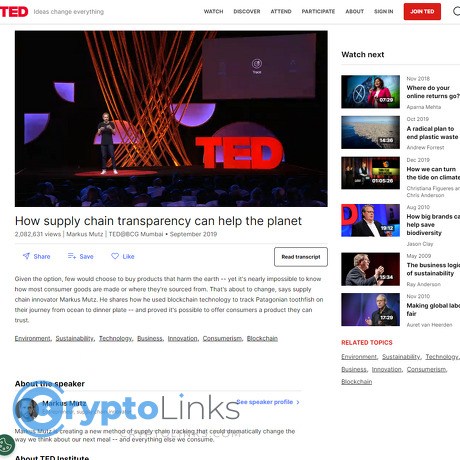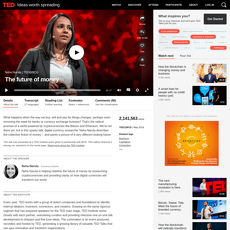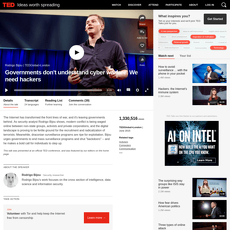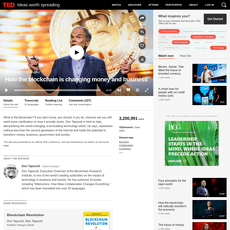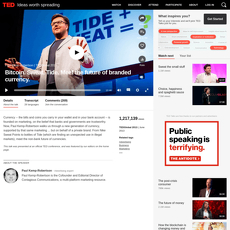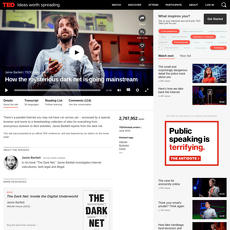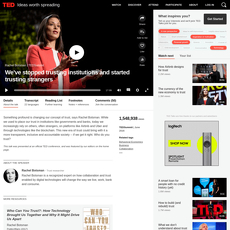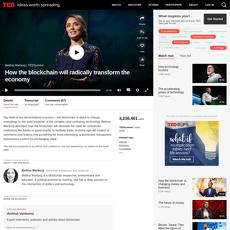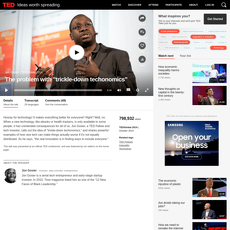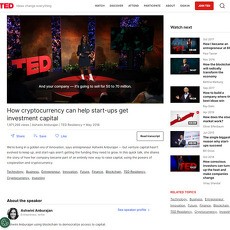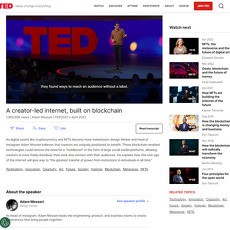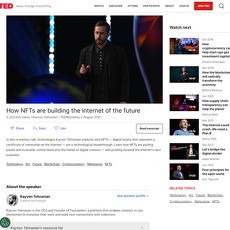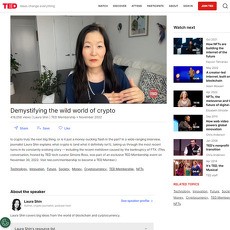Markus Mutz: How supply chain transparency can help the planet Review
Markus Mutz: How supply chain transparency can help the planet
www.ted.com
Markus Mutz TED Talk Review: How Supply Chain Transparency Can Help the Planet (and Your Business)
What if every product you bought came with proof it didn’t damage forests, oceans, or people—right down to the GPS coordinates and time-stamped custody events? Would you change what you buy? Would your customers?
That’s the bold, practical promise behind Markus Mutz’s TED talk. And it’s not hype. It’s a clear path to cut risk, build trust, and even reduce costs by making your supply chain visible end-to-end—using tools you probably already know (and a few you should). Whether you’re in crypto, logistics, retail, or policy, this is the playbook you can actually use.
The real problem: opacity is costing you
Most supply chains are still black boxes. That’s a liability now, not a quirk of global trade. When you can’t see upstream, all kinds of trouble slips in—and sticks to your brand:
- Greenwashing and false claims: Without verifiable proof, sustainability claims are just marketing. Regulators are paying attention. The EU’s moves on green claims and the deforestation regulation raise the bar for evidence, not slogans.
- Deforestation-linked sourcing: Cattle, soy, palm, and cocoa are high-risk. Satellite projects like Global Forest Watch make forest loss visible, and buyers are expected to check. No proof, no pass.
- Forced labor and human rights risk: Under the U.S. UFLPA, customs has detained thousands of shipments worth billions for forced-labor concerns. If you can’t prove clean origin, your cargo can sit.
- Regulatory fines and product holds: ESG rules are shifting from voluntary to mandatory. Documentation gaps now translate into fees, seizures, or lost contracts—especially in public procurement.
- Disruptions and delays: COVID shocks, canal blockages, and port congestion exposed how visibility gaps slow reaction time. If you can’t see tier-2 and tier-3 suppliers or handoffs, you can’t reroute in time.
- Angry customers and lost sales: Shoppers reward proof. A 2023 McKinsey & NielsenIQ study found products with sustainability claims grew sales faster than those without, but only when claims were credible. Proof wins; fluff backfires.
Teams feel this every day: data scattered across emails and PDFs, supplier attestations you can’t verify, and spreadsheets pretending to be traceability systems. Meanwhile, the majority of a company’s environmental footprint sits in Scope 3—often 80%+ for consumer sectors—so what you can’t see, you can’t fix.
What I’m offering you here
I’m breaking down Markus Mutz’s key ideas into something you can put to work immediately:
- Why transparency matters now for risk, growth, and compliance—backed by current regulations and buyer expectations.
- The tech that makes it work (yes, including blockchain), plus satellites, IoT, QR codes, and smart audits.
- A simple roadmap any team can run—map risk, set KPIs, verify, pilot, scale.
- Clear answers to the most common questions I get on public sector transparency, CSR, and maritime logistics.
Expect practical examples, not theory. Think “show me the chain of custody and location proofs,” not “trust me, it’s sustainable.”
Who is Markus Mutz—and why this talk matters
Markus Mutz is the co-founder of OpenSC (originally incubated with WWF support), a platform built to verify product origin and journey in real time. In his TED talk, he shows how modern traceability—combining tamper-evident ledgers, satellite checks, and item-level tags—can spot illegal practices and reward responsible producers with better access to markets.
It’s all very real-world:
- Seafood you can scan: Verified catch location and custody events so buyers avoid illegally caught fish. Projects with responsible fisheries have shown how a QR code on pack can link you to vessel, catch zone, and temperature logs.
- Beef without forest loss: Geofenced ranches and satellite alerts prove cattle didn’t graze on recently cleared land. If a supply node trips a deforestation alert, purchasing can block or re-route.
- Consumer-grade proof: A QR code on the product pulling from a tamper-resistant record (blockchain or similar) lets customers, auditors, and regulators check claims instantly.
“Trace what you buy back to source, verify it, and use that proof to move demand—and rewards—toward ethical, low-impact producers.”
The punchline is simple: transparency isn’t just feel-good. It’s a competitive moat. Walmart’s food traceability with IBM Food Trust, for instance, cut traceback times from days to seconds for leafy greens—speed that matters in recalls and regulation. Walmart China has also used blockchain to trace pork and produce through a QR experience consumers can actually use. When proof is fast and public, the whole market shifts.
If you’ve ever wondered how to go from “we think” to “here’s the evidence,” you’re in the right place. Want to see exactly what the TED talk covers—and why this timing is perfect for your team?
What the TED talk covers and why it matters right now
I love talks that turn buzzwords into blunt tools. This one does exactly that. The message is simple: make supply chains visible so we can choose better—and force the market to reward the people doing things right. That’s not some far-off hope; it’s happening now because regulation, investors, and customers are pushing in the same direction.
Regulators are raising the floor. The EU Deforestation Regulation will require geolocation of plots for commodities like cattle, cocoa, coffee, palm oil, rubber, soy, and timber—no valid proof, no entry to the EU market. In the U.S., the Uyghur Forced Labor Prevention Act is already blocking shipments that can’t prove clean origin. Investors and lenders are tying capital to traceability and ESG risk. And customers? They’re not just “curious”—they expect receipts.
“Proof changes behavior.”
That’s the heart of this talk. When origin and custody are verifiable, bad actors lose their edge and responsible producers finally get credit. Procurement gets faster, recalls get cleaner, and compliance stops being a scramble.
The big idea in one line
Trace what you buy back to the source, verify it, and use that proof to steer demand and dollars toward ethical, low-impact producers.
It sounds obvious until you try it. The power is in making the verification portable—anchored to the product, auditable by any buyer, and hard to tamper with once recorded. That’s what turns “claims” into evidence.
Real-world examples you can learn from
- Responsible seafood with a scannable story. OpenSC worked with Austral Fisheries to trace Patagonian toothfish and prawns from vessel to plate using GPS-enabled vessel data and chain-of-custody checks. Scan a code, see where and how it was caught, and confirm certification status in seconds. Pair that with vessel transparency from Global Fishing Watch and you’ve got a powerful deterrent to illegal fishing.
- Deforestation-free sourcing, enforced by satellites. Companies like Nestlé have used satellite monitoring (e.g., Starling by Airbus/Earthworm) to flag forest loss around palm concessions and farms, then cut or correct suppliers accordingly. Under the EU’s rules, geolocation polygons will become table stakes for cattle, cocoa, and more—so satellite checks move from “nice” to non-negotiable.
- Recalls that don’t wreck your week. Walmart’s mango proof-of-concept showed that tracing a pack’s origin didn’t have to take six days of phone calls; it dropped to seconds once events were captured digitally and linked to the product, then surfaced via QR code in stores. That speed is the difference between surgical action and a brand-sized migraine.
- Beef with a paper trail you can actually check. Uruguay’s national livestock ID system tracks cattle from farm to slaughter with RFID, giving exporters and retailers farm-of-origin proof that can be exposed to buyers via QR. When you overlay geolocation and deforestation screening, you move from “origin known” to “origin approved.”
- Procurement that filters out risk by default. When verification data rides on a GS1 Digital Link or similar standard, purchasing systems can auto-flag lots that fail criteria (e.g., missing geolocation, forced-labor alerts, expired audits). That means compliance isn’t a side-process; it’s how the system buys.
The thread through all of these: claims are tied to the item, not a PDF in someone’s inbox. And they’re cross-checked by independent signals—satellites, vessel data, site audits—so we’re not just trusting a form; we’re trusting corroborated evidence.
Who should watch this
- Brand and product leaders who want to win trust and avoid greenwashing traps.
- Procurement and sourcing teams under new rules like EUDR, LkSG, and UFLPA.
- Compliance and legal looking to move from annual reports to continuous proof.
- Logistics and operations that need faster, cleaner recalls and fewer blind spots.
- Investors and lenders pricing supply chain risk into capital decisions.
- Policy makers designing incentives and enforcement that actually work in the real world.
- Crypto and data builders working on traceability, tokens-for-proof, and tamper-evident records.
If you’re wondering what specific tools make this practical—how to anchor events so they can’t be quietly changed, how satellites and sensors plug in, and which standards stop you getting trapped in a vendor silo—that’s exactly where we’re headed next. Ready to see the stack that makes the proof stick?
The transparency toolkit: tech, data, and standards you’ll hear about
I like tools that don’t just look good in a slide deck—they work in the mess of real-world supply chains. Here’s the stack that actually lands: tamper-resistant ledgers, eyes-in-the-sky satellites, on-the-ground IoT, simple QR codes, and shared data standards that keep everyone speaking the same language.
“Sunlight is the best disinfectant.” — Louis Brandeis
When sunlight meets proof, bad actors run out of shadows and good producers finally get credit.
Blockchain’s role (and limits)
Use blockchain where it’s strong: anchoring facts so nobody can quietly rewrite history. It’s the backbone for proof-of-origin and custody events—but only if the inputs are trustworthy.
- Anchor the “who/what/when/where.” Hash and sign purchase orders, bills of lading, batch IDs, and custody handoffs. If someone tries to back-date or edit an event, the ledger exposes it.
- Permissioned vs. public chains. Regulated industries often start with permissioned networks for speed and access control (e.g., IBM Food Trust). Public chains can add independent verifiability or consumer-facing proofs.
- Don’t skip verification. Garbage in, garbage out. Pair ledgers with audits, satellite checks, sensor attestations, and signed attestations from verified identities.
- Selective disclosure. With W3C Verifiable Credentials and zero-knowledge techniques, you can prove a claim (e.g., “deforestation-free”) without exposing sensitive supplier lists.
Real-world proof points:
- Walmart leafy greens moved to blockchain-backed traceability to accelerate recalls and reduce risk, using standardized event data and supplier onboarding through IBM Food Trust. Case overview
- Carrefour lets shoppers scan QR codes to see lot-level data (e.g., chicken, milk, tomatoes) tied to an immutable record, boosting trust and repeat purchase. Press release
- De Beers Tracr tracks diamonds from mine to retail, using distributed ledgers and tamper-evident data to block conflict stones. Tracr
- Bumble Bee Foods put tuna traceability into a QR code experience, backed by a blockchain record and SAP. Announcement
Helpful background: World Economic Forum’s toolkit on blockchain in supply chains outlines where ledgers add value—and where they don’t. WEF resource
Satellites, IoT, and QR codes
Truth lives at the edge—on ranches, vessels, farms, and trucks. That’s where satellites and sensors keep everyone honest, and where simple QR codes turn proof into trust.
- Satellites for land-use and geofencing. Tools like Global Forest Watch GLAD alerts (Landsat), Planet high-frequency imagery, and Sentinel radar spot clearing even under clouds. This is critical for meeting the EU Deforestation Regulation’s geolocation requirements. EUDR overview
- IoT sensors for custody and quality. Temperature, humidity, shock, and door-open events seal the cold chain and prove chain of custody. Example: Maersk’s Remote Container Management gives live reefer telemetry to shippers. Maersk RCM
- Geotagged catch and vessel behavior. In seafood, GPS-enabled devices and AIS patterns flag suspicious activity. OpenSC used geofenced verification to certify legal, sustainable Patagonian toothfish with Austral Fisheries, shareable via QR. OpenSC
- QR codes for instant proof. A scan shows origin, certifications, and custody trail—simple for buyers, powerful for auditors. It’s the on-ramp for everyone who isn’t buried in an ERP.
Why this matters: academic and NGO programs consistently show that near-real-time deforestation alerts and vessel monitoring change behavior by increasing the probability of detection. For a practical starting point, Global Forest Watch and local enforcement data create a strong, auditable signal without huge cost.
Data governance and privacy
Transparency doesn’t mean exposing your playbook. Set rules so each partner sees what they need—and nothing they don’t.
- Role-based visibility. Procurement may see supplier identities; consumers see verified claims; regulators get mandatory datasets (e.g., farm polygons for EUDR).
- Privacy-first proofs. Use W3C Verifiable Credentials to issue signed claims (e.g., “this lot is FSC-certified”). Add selective disclosure or zero-knowledge methods to prove compliance without revealing sensitive data.
- Data clean rooms and escrow. Share and match data with encryption and auditing so competitors can cooperate on risk signals without leaking IP.
- Compliance guardrails. Build in GDPR/CCPA controls, retention schedules, and data lineage logs. Every access and edit should leave a trace.
Tip: store bulky evidence (imagery, certificates, sensor logs) off-chain in secure storage, and anchor their hashes on-chain. You keep performance and reduce costs while preserving tamper-evidence.
Interoperability and standards
If your traceability lives in a vendor silo, it’s not traceability—it’s a demo. Interop is the difference between a pilot and a platform.
- GS1 identifiers and events. Use GTIN (products), GLN (locations), and EPCIS 2.0 for standardized “who/what/when/where” events across systems. GS1 EPCIS 2.0 | GS1 Digital Link
- Open product and location schemas. Keep IDs portable with JSON-LD, OpenAPI specs, and consistent code lists so ports, carriers, and brands can sync quickly.
- Identity and attestations. W3C Decentralized Identifiers (DIDs) and Verifiable Credentials let auditors, certifiers, and suppliers issue cryptographically signed claims that any system can verify. W3C VCs
- Sector standards. In seafood, the MSC Chain of Custody is widely recognized; align your data pipeline so certificates and batch IDs are machine-readable. MSC CoC
- Logistics messaging. For ocean freight, look to DCSA standards so container events and documents interoperate across carriers and ports. DCSA standards
The core idea: common IDs + common event models + signed claims = plug-and-play traceability across platforms and borders. That’s how you avoid re-keying data at every hop and keep costs sane.
Everything above is the “what.” Want the “how” without getting bogged down or burning months in meetings? In the next section I’ll lay out a fast, practical plan to map risks, set the right KPIs, and wire verification into daily workflows. Which product would you start with if we launched a pilot this quarter?
From talk to action: a simple roadmap you can run with
“If you can’t measure it, you can’t improve it.” Yes, Drucker’s line gets overused—because it’s true. I’ve watched teams sit on good intentions and pretty PDFs for years. The switch flips the moment they turn vague values into verified events and KPIs. Here’s the exact plan I use to go from inspiration to working transparency—with results your CFO, compliance lead, and customers can actually feel.
Map your supply chain and risk hotspots
I start small: one SKU, one lane, one country pair. Then I map the real world, not the PowerPoint version.
- List the actors and hops: Tier 1–3 suppliers, farms/plots, processors, consolidators, carriers, ports, and DCs. Include purchase orders, bills of lading, and handoffs. For ocean legs, capture vessel name + IMO and planned ports.
- Tag high‑risk materials and routes: Cattle/beef (Amazon/Cerrado), palm oil (Indonesia/Malaysia), cocoa (Côte d’Ivoire/Ghana), rubber, timber, and high‑risk seafood corridors. The FAO attributes about 90% of global deforestation to agriculture—if your inputs touch those fronts, they’re priority one.
- Collect the minimum viable proof:
- Land-linked goods: farm polygons (GPS), supplier IDs, and certificates where relevant.
- Seafood: catch area, gear type, vessel IMO, and AIS track continuity (watch for >2h gaps near transshipment hotspots).
- Ports and public sector flows: port call timestamps, terminal handoffs, and customs filings tied to shipment IDs.
- Overlay rules and sanctions: EU Deforestation Regulation requires geolocation for cattle, cocoa, coffee, palm oil, rubber, soy, and timber entering the EU; the U.S. UFLPA is actively detaining goods linked to forced labor (the CBP dashboard shows over $2B in shipments impacted).
- Create a one-page risk heatmap: Score each material x route on deforestation, labor, and maritime risk (1–5). Circle the top three red boxes and work those first.
Quick win example: a coffee roaster I advised added farm polygons and receipt scans for one Colombian lot. They cross-checked those polygons weekly against Global Forest Watch. That simple step unlocked EU access under EUDR and cut their audit time by weeks.
Set goals and KPIs that matter
Vague pledges won’t protect you. Numbers will. Here are targets I set so progress is obvious and defensible.
- Deforestation-free by a date that counts: e.g., “100% of cocoa and palm volumes geolocated to farm polygons and verified against deforestation alerts weekly by Q2 2025.”
- Traceability coverage: “95% traceable from Tier 1 → Tier 3 with event-level chain of custody for priority SKUs.” Use GS1 IDs and timestamps.
- Time-to-trace: Remember Walmart’s IBM Food Trust pilot, where mango origin lookup fell from 6 days to 2.2 seconds? Set your own: “Investigate any SKU’s origin within 4 hours, then 1 hour.”
- Forced labor controls: “0 high-risk supplier hits on UFLPA checks; 100% of shipments screened against entity lists before departure.”
- Maritime integrity: “>90% AIS continuity for at-sea legs; 100% port calls time-stamped with terminal handoffs.” Use Global Fishing Watch style risk flags for seafood and transshipment-prone routes.
- Alert responsiveness: “Exception-to-escalation in under 2 hours; corrective action plan started within 24 hours.”
- Customer-facing proof: “At least 30% of units carry a QR that resolves to a verifiable product journey.” Consumers do reward it—one field experiment found shoppers paid a premium for Fair Trade labeling in a U.S. grocery setting (Hainmueller, Hiscox, and Sequeira).
Every KPI ties to revenue protection or cost avoidance. If a target can’t be linked to lost sales, seized goods, or faster release times, it’s probably fluff.
Build verification into workflows
Transparency sticks when it’s not extra work—it’s the way work happens. I wire verification into the tools teams already use.
- Supplier attestations + third-party checks: Collect supplier self-reports, then verify with certifications (e.g., Rainforest Alliance, MSC) and independent audits. Attestations alone are just claims.
- Automatic red flags from space and sea:
- Land: feed farm coordinates into satellite alert systems. Trigger a case if a polygon intersects a new loss alert.
- Ocean: monitor AIS for dark activities, risky transshipment patterns, and port calls that don’t match the manifest.
- On-chain event logging (anchored, not everything on-chain): Hash GS1 EPCIS 2.0 events (receive, pack, ship) to a tamper-resistant ledger. Keep sensitive data off-chain, store proofs on-chain. This prevents quiet edits without exposing supplier IP.
- Verifiable credentials for suppliers: Issue W3C Verifiable Credentials to plants, farms, and vessels (e.g., “EUDR-compliant cocoa farm” or “line-caught tuna vessel”). Buyers can verify cryptographic proofs in milliseconds via a QR or link.
- Make exceptions impossible to ignore: Push alerts into Slack/Teams with a one-click path to the purchase order and shipment. If an alert can hide in a dashboard, it will.
- Privacy first: Share only what each partner needs. Use role-based access and, where needed, zero-knowledge style attestations (e.g., proof a farm isn’t in a restricted zone without revealing the exact coordinates).
Seafood example: One tuna processor logged custody events to a shared ledger and cross-checked vessel AIS against known transshipment hotspots. The number of “cannot verify” lots dropped by half within one season, and an importer released payments faster because proof was instant.
Pilot, measure, then scale
I like 12-week sprints. Fast enough to keep momentum, long enough to prove a point.
- Weeks 0–2: Pick one SKU/lane. Map suppliers, farms/vessels, and ports. Define KPIs and data fields (IDs, timestamps, geo, certs).
- Weeks 3–4: Wire data pipes: supplier portal or form, EPCIS events, AIS feed, satellite alerts. Stand up a lightweight case management board.
- Weeks 5–6: Start verification in the loop: farm polygons vs deforestation alerts; AIS continuity checks; basic on-chain anchoring.
- Weeks 7–8: Train procurement, quality, and logistics to work exceptions. Tie stop/go rules to POs and shipment releases.
- Weeks 9–10: Turn on a consumer/auditor-facing QR. Show the journey and the cryptographic proofs behind it.
- Weeks 11–12: Review: time-to-trace, number of prevented issues, audit outcomes, and cost hits avoided (e.g., detentions). Publish a 2-page internal playbook and supplier onboarding pack.
Budget reality check: A focused pilot can land in the $25k–$150k range depending on data capture and lanes. If you ship into the U.S. or EU, avoiding a single detained container or a failed audit can pay that back. The U.S. CBP’s UFLPA enforcement page shows how quickly detentions add up—worth bookmarking: CBP UFLPA dashboard.
Scale with policy, not heroics:
- Bake compliance into contracts: “No PO without geolocation + verifiable events.”
- Reward good actors: faster onboarding, preferred pricing, longer terms for verified suppliers.
- Standardize IDs and formats (GS1, EPCIS 2.0) so new partners plug in without custom builds.
- Publish outcomes: exception rate, time-to-trace, and verification coverage. Customers don’t expect perfect; they want honest progress with proof.
“Sunlight is the best disinfectant.” — Justice Louis Brandeis
Now the real question: once this machine is running, where does the payoff land—planet, profit, compliance, trust? And which KPI will move your P&L first? Keep going; that’s exactly what I’m unpacking next.
Why transparency pays: planet, profit, compliance, and trust
Transparency isn’t a cost center. It’s a growth engine, an insurance policy, and a trust builder—all in one. The kicker? It also cuts your climate and human-rights risk.
“Sunlight is said to be the best of disinfectants.” — Louis Brandeis
I’ve seen brands win market share, teams move faster in crises, and compliance headaches evaporate—simply because they could show how stuff was made, moved, and verified. Here’s what changes when the lights are on.
CSR and stakeholder trust
Being open about sourcing—and backing it up with proof—turns CSR from a glossy PDF into a living system customers and investors can believe in.
- Sales tailwind: NYU Stern’s Center for Sustainable Business found that sustainability-marketed consumer products grew 2.7x faster than conventional ones and captured 30% of CPG growth from 2013–2022, often with an average 28% price premium. Source: NYU Stern CSB.
- Belief-driven buying: People reward brands that show their work. Edelman reports a global majority buy or advocate based on values; transparency is the fastest way to signal the values behind a product. Source: Edelman Trust Barometer.
- Proof beats PR: When Carrefour added QR-based traceability to items like chicken and tomatoes, it publicly credited the program with boosting consumer trust and sales. Customers scanned, saw farm-to-shelf details, and rewarded the brand. Coverage: FoodNavigator.
Want a simple barometer? If a customer emails “How do you know this is deforestation-free?” and you can answer with a timestamped chain of proof—not a paragraph of marketing—that’s trust.
Public supply chain significance
Public procurement impacts millions of lives. Transparent chains help agencies buy responsibly, avoid scandals, and meet the law without drama.
- Human-rights compliance: Under the U.S. Uyghur Forced Labor Prevention Act (UFLPA), imports with unverifiable origin are at risk. U.S. Customs has detained over $2B in shipments since the rule took effect—often because importers lacked credible proof. Source: CBP UFLPA Statistics.
- Deforestation due diligence: The EU’s Deforestation Regulation (EUDR) requires geolocation proof for commodities like cattle, cocoa, coffee, soy, palm oil, and rubber. No traceable plot data? No access. Applicability starts December 2024 for large operators. Source: European Commission.
- Audit-ready by design: When tenders ask for sustainability and labor assurances, real-time traceability turns “we believe” into “here’s the file.” That reduces investigation time, reputational risk, and emergency re-sourcing costs.
For NGOs and public buyers, transparency doesn’t just tick boxes—it protects people on the ground and keeps taxpayer money aligned with stated values.
Efficiency and resilience
Visibility cuts waste and speeds decisions. When something breaks, you pinpoint the where/when fast and act before it snowballs.
- Recall scope shrinks: Walmart’s mango pilot took farm-to-shelf traceability from nearly a week to 2.2 seconds—not theoretical, measured. Faster trace means smaller recalls and fewer lost sales. Source: IBM Food Trust x Walmart.
- Less dead stock, fewer write-offs: Knowing what sits where (and its condition) stops over-ordering and reduces spoilage. That’s real money saved before any “innovation program” even starts.
- Early-warning signals: Satellite deforestation alerts, factory power-usage anomalies, or temperature spikes in a reefer—these let you reroute or quarantine product in hours, not days.
- On-chain event logs: When custody events are time-stamped and tamper-evident, teams stop wasting days reconciling spreadsheets. The ops calendar moves from reactive to proactive.
Resilience used to be a buzzword; now, it’s measurable. Lead times tighten, exception-handling improves, and your team spends less time firefighting and more time shipping.
Maritime logistics focus
Ocean legs are where great plans go to hide. Transparency turns the black water blue.
- Regulatory clean sheet: AIS integrity and “dark activity” monitoring are no longer optional. OFAC’s maritime advisories call out spoofing and ship-to-ship transfers as sanction risks. If your chain can flag gaps in vessel signals or suspicious transshipments, you avoid fines and seizures. Source: U.S. Treasury/OFAC Maritime Guidance.
- Ethical seafood and IUU risks: Platforms like Global Fishing Watch use satellite data to reveal fishing effort, port calls, and potential labor-abuse risk indicators. Tie that to your purchase orders and you can actually enforce your policies.
- Port performance in real time: Transparent berth schedules, container status, and customs milestones reduce demurrage and detention. Fewer “where’s my box?” tickets, more on-time handoffs.
- Carbon and cost: With emissions reporting tightening (hello, EU ETS and IMO rules), visibility into vessel behavior and route choices helps you cut fuel, fees, and your footprint at the same time.
From sanctions screening to cold-chain integrity, maritime transparency makes the difference between a clean arrival and a costly surprise.
Here’s the fun part: you don’t need a seven-figure transformation to get these wins. Want a shortlist of tools and links that actually work in the real world—blockchain-backed proofs, QR experiences customers love, satellite alerts you can plug into your stack in a week? Ready to see which ones play nice with your suppliers without a heavy lift?
Tools, examples, and helpful links to get you started
If you’re ready to turn transparency from a buzzword into something your team can actually run, here’s the starter kit I keep bookmarked. Every pick below pairs proof with practicality—think on-ground verification, satellite signals, on-chain anchors, and QR codes your customers can scan in seconds.
Platforms and projects worth a look
- OpenSC — opensc.org
Traceability + verification + consumer proof. Built for real-world ethics at scale. Used to verify deforestation-free beef and responsibly caught seafood, with QR codes that show origin and time-stamped events. Co-founded by Markus Mutz—so yes, it aligns tightly with the talk. - Provenance — provenance.org
Product claims backed by evidence. Turns sustainability claims into verifiable proof customers can see. Supports on-pack QR and granular claim templates tied to evidence so marketing doesn’t get ahead of compliance. - Circulor — circulor.com
Complex materials, EV batteries, Scope 3. Tracks minerals from mine to manufacturer and flags risk (including forced-labor exposure). Volvo Cars used Circulor to trace cobalt in EV batteries; this is what “proof at scale” looks like in heavy industry. - IBM Food Trust — ibm.com/products/food-trust
Food safety + farm-to-shelf transparency. Carrefour used this to let shoppers scan poultry, eggs, and tomatoes and see farm data and handling events. It’s a mature stack that integrates with GS1 standards. - VeChain — vechain.org
On-chain product passports. Known for QR/NFC consumer proofs tied to batches and SKUs. Walmart China piloted food traceability using VeChain; if you need quick on-pack verification, this is a practical option. - Tracr (De Beers) — tracr.com
Diamonds with digital twins. De Beers announced it moved all its production onto Tracr—proving that immutable custody records can work at global scale in high-value, high-risk categories. - Sourcemap — sourcemap.com
Tier mapping + UFLPA workflows. Helps brands map suppliers down to raw material, manage attestations, and prep for audits. Strong fit if you’re staring down U.S. forced-labor enforcement or the EU Deforestation Regulation. - Altana Atlas — altana.ai
Network-level visibility. Builds a “map of the supply chain” across millions of companies. Useful for spotting hidden linkages to sanctioned regions, and for stress-testing alternate suppliers before disruption hits. - Global Forest Watch — globalforestwatch.org
Deforestation alerts. Free, credible satellite monitoring to cross-check sourcing areas for commodities like cattle, palm, cocoa, and soy. Great for automated geofenced supplier checks. - Global Fishing Watch — globalfishingwatch.org
Maritime transparency. AIS-based vessel behavior analytics to flag risky fishing patterns or transshipments. Handy for seafood import controls and NGO/auditor collaboration. - GSBN (Global Shipping Business Network) — gsbn.trade
Container shipping data sharing. For ocean freight documents and status updates with strong governance. Pairs well with DCSA standards and eBL providers when you need trusted milestones. - eBL providers (for paperless, provable handoffs): WAVE BL, CargoX, Bolero
Digital bills of lading with audit trails. Reduce fraud, accelerate financing, and create a clean chain of custody for maritime shipments.
Why these? They combine tamper-resistant records with independent signals (audits, satellites, or IoT), which is what regulators and customers increasingly expect. U.S. Customs and Border Protection has already detained over $2B in goods under UFLPA—proof beats promises.
Reading list and resource bundle
- Standards that make your stack interoperable
- GS1 EPCIS 2.0 (event data across partners)
- GS1 Digital Link (QR/NFC product web identifiers)
- W3C Verifiable Credentials (portable, signed attestations)
- DCSA track-and-trace & eBL standards (container shipping)
- IMO numbers (vessel identity everyone recognizes) - Policy and guidance you’ll be asked about
- OECD Due Diligence Guidance (baseline for risk-based supply chain checks)
- UFLPA resources (CBP) (forced-labor enforcement in the U.S.)
- EU Deforestation Regulation (geolocation + risk checks for key commodities) - Research for your ROI slide
- WEF: Redesigning Trust (what to use blockchain for—and what not)
- McKinsey supply chain insights (visibility, resilience, cost cases)
- CDP Supply Chain reports (how transparency links to cost savings and supplier engagement) - Maritime visibility and compliance helpers
- MarineTraffic / VesselFinder (AIS tracking for monitoring and investigations)
- OFAC SDN list, EU consolidated sanctions, UK HMT (screen before you book) - My curated bundle
I keep a running list of explainers, templates, and examples here: Open the resource bundle
Quick FAQ: straight answers to common questions
Q: What’s the significance of transparency in public supply chain management?
A: It provides verifiable proof of origin and movement so agencies can meet environmental and human-rights laws, reduce fraud and leakage, and keep taxpayers informed. Bonus: the same data streamlines audits and speeds emergency procurement when timelines shrink.
Q: What role does transparency play in CSR within the supply chain?
A: It turns “we care” into receipts. Publishing the how (standards used), the where (geolocated suppliers), and the proof (audits, satellite checks, on-chain events) earns trust from customers, investors, and employees. No spin—just evidence.
Q: What’s the primary purpose of transparency in maritime logistics?
A: To see port operations, cargo handoffs, and vessel behavior in time to act—avoiding sanctions breaches, forced-labor risks, and costly delays. Clear, standardized milestones (DCSA, eBLs, AIS) mean you spot exceptions early, not after the container misses the cut-off.
Want the fast path from tools to your first working pilot? In the next section I’ll show you exactly how I pick one route, one product, and one verification method to get a win in under a quarter—want that template?
Watch, learn, and act: your next steps
Here’s the move: watch Markus Mutz’s talk, share it with your team, and pick a small, winnable pilot you can launch this quarter. Ten focused hours beat ten months of hand-wringing.
Start here:“How supply chain transparency can help the planet — and your business”.
Small, verifiable wins create momentum. Your first traceable SKU becomes your template for the next ten.
What to look for as you watch
- Proof over promises: Notice how he turns claims into evidence. This is the shift from “trust us” to “see for yourself.”
- Verification in the wild: Think satellites catching forest loss, AIS showing vessel behavior, and on-chain events locking handoffs. This stack is already working in the field. For example, Walmart cut the time to trace sliced mangoes from nearly a week to seconds using a shared ledger approach (IBM/Walmart).
- Incentives that change behavior: Look for how verified suppliers earn access, premiums, or shelf space. Nestlé piloted blockchain traceability with OpenSC to track milk from New Zealand and palm oil—proof turned into procurement power (Nestlé x OpenSC).
- Consumer-facing proof: QR codes that show the journey are not fluff. They’re audit breadcrumbs. Seafood brands have used this to reassure buyers and regulators; see OpenSC’s work with responsible fisheries (OpenSC).
- Regulatory tailwinds: This isn’t optional anymore. U.S. Customs has detained billions of dollars in goods over forced-labor risks under UFLPA—traceability reduces the odds your shipment is next (CBP UFLPA stats).
- Maritime signals you can use: Vessel AIS, port events, and digital documents are becoming the norm. Keep an eye on electronic bills of lading progress (DCSA eBL).
Team checklist for week one
- Pick one high-risk product: Choose a single SKU or lane (e.g., cocoa powder from Supplier X, or refrigerated seafood from Port A to Port B).
- Map the path in 90 minutes: Tier 1–2 suppliers, key handoffs, ports, and carriers. Keep it rough but real.
- Choose one verification method to test:
- Geolocation proof (collect farm/forest coordinates and run alerts via Global Forest Watch).
- On-chain custody events (lot IDs logged at each handoff; anchor hashes on a shared ledger your partners can access).
- Vessel behavior checks (monitor AIS via MarineTraffic or similar; flag risky transshipments).
- QR code to a live proof page (batch ID, origin, certs, and last verified handoff).
- Set success metrics:
- Time-to-trace back to source under 1 hour.
- Coverage: 80% of lots traced through Tier 2.
- Exceptions visible within 24 hours (missing docs, location mismatch, AIS gaps).
- Supplier onboarding time under 2 weeks.
- Create a simple “proof page” template: Batch ID, origin coordinates, verification events, and the last auditor or sensor check. Keep it human-readable.
- Book the pilot review now: Put a date on the calendar for a 30-minute check-in two weeks from today. Decide in advance what “go/no-go to scale” looks like.
Final thoughts and call to action
Transparency is now the baseline. The sooner you start collecting proof, the sooner your good actors win and your risk drops. Watch the talk, pick one pilot, and get a measurable result on the board in the next 30 days.
If you want my curated tools and crypto-enabled traceability picks, keep an eye on cryptolinks.com—and ping me what you’re building. I’m happy to point you to the sharpest solutions I’ve seen and, if it’s good, spotlight your pilot so others can learn from it.

